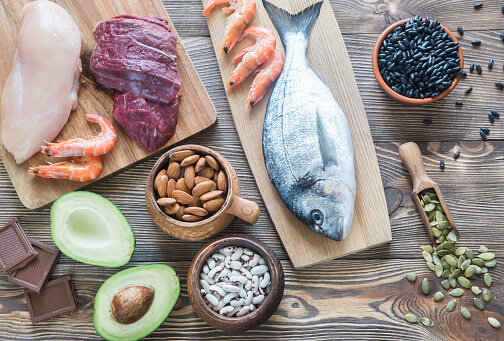For Better Overall Oral Health, Make Sure to Get Enough Zinc!

By Joy Stephenson-Laws, J.D., Founder
Everyone has heard about “superfoods,” such as kale or quinoa, that pack a ton of nutritional punch in literally every bite. There are also what I like to call “super minerals,” such as magnesium, that offer a variety of benefits. One of these “super minerals” that it is important to know about, and to make sure you are getting enough of, is zinc. In addition to supporting a variety of bodily processes, it is perhaps one of the best nutrients for supporting your overall oral health. Given that it helps protect your teeth, gums and inside of your mouth from a variety of diseases, as well as promote healing, it truly deserves the moniker of “super mineral.” Some may even call it the superhero of oral health!
Zinc is what is known as a trace mineral, which means that your body needs very little of it to reap its benefits. In fact, the recommended daily amount of this mineral is 11 milligrams (mg) for men and eight mg for women. In contrast, the recommended daily amount of calcium, a “macromineral,” is 1,000 mg per day (this increases to 1,200 mg for women over 50 and men over 70).
Zinc can be found in your saliva, dental plaque and the enamel that forms the outer layer of your teeth. Let’s take a closer look at the many benefits of zinc when it comes to your mouth:

Zinc is critical for healthy teeth since it helps prevent plaque and dental calculus (which is calcified plaque). It also helps prevent your tooth enamel (the hard, white exterior surface that you can see and touch) from what is known as “demineralizing” as well as helping it “remineralize.” The former weakens tooth enamel, and the latter helps keep it strong, which is important for preventing tooth decay and cavities.
Gums
If you have ever had periodontal disease, you may have had gums that bleed easily, most likely when you brushed or flossed. Zinc plays a role in helping your bleeding gums heal faster as well as having an immunological, or protective, effect on the tissues in your mouth. It also can help prevent the bone loss that can be the result of periodontal disease. By combating gum disease, zinc also helps reduce your risk for some serious health issues such as cancer, heart disease, diabetes and rheumatoid arthritis.
Lining of Your Mouth
Research indicates that the lining of your mouth, also known as the oral mucosa, needs zinc to be its healthiest. Not having enough of this trace mineral has been associated with a variety of mouth problems, such as oral lichen planus, a chronic condition that can cause swollen tissues and open sores; sores on the tongue; and dry mouth. More research still needs to be done on the link between canker sores (also known as aphthous ulcers) and zinc, since it is not clear if not having enough zinc is a cause or a result of having them.
Zinc may also help with another condition known as oral mucositis, which is acute inflammation of the oral mucosa in people undergoing radiation and/or chemotherapy. While some studies have shown that zinc (in the form of zinc sulfate) has no real impact on oral mucositis, one study on leukemia patients undergoing chemotherapy who took zinc sulfate showed a reduced risk of developing this condition.
Bad Breath
One cause of bad breath (also known as halitosis) is the sulfur produced by bacteria that live in your mouth. It can be especially active in the mouths of smokers. One possible solution is to use a mouthwash or toothpaste that includes zinc since studies indicate that not having enough zinc can promote this type of bad breath.
Preventing Other Oral Conditions and Disease
Several studies suggest that pregnant women who are deficient in zinc run a higher risk of giving birth to a child with a cleft lip or palate, which are openings or splits in the roof of the mouth and lip. It also may play a role in preventing mouth lesions from becoming cancerous. Zinc may even help with the treatment of cold sores!
How to Be Proactive About Zinc
Studies have shown that zinc deficiency is very common. Since our bodies do not produce this mineral, we need to get it through our diet. Unfortunately, various environmental factors and farming practices can reduce the amount of zinc found in soil, which can subsequently impact how much bioavailable zinc there is in the foods we eat. For this reason, it’s a good idea to eat a variety of foods rich in zinc to make sure we are getting enough.
Some of these foods are:
- oysters
- red meat
- poultry
- chia seeds
- beans
- almonds, walnuts, pistachios, pecans
- tofu
- broccoli
- oatmeal
- spinach
Most people can get their daily recommended amount of zinc from the foods they eat. This is the best way to get your daily zinc, because it is more easily absorbed this way.
Are You Getting Enough Zinc?
There is a very simple test to see if you have enough zinc in your system. Grab some liquid zinc from your local health store and swish a tablespoon around in your mouth.
If you immediately get a strong unpleasant or metallic taste in your mouth, then you probably have an adequate amount of zinc in your system. However, if the zinc tastes like water or even sweet, you may be deficient. Without enough zinc in your diet, you may experience a decreased sense of taste. The best way to know if you are getting enough zinc, however, is to get a nutrient test that will measure the level of zinc and other nutrients in your body. You and your doctor can review the results and then put together a nutrition and diet plan to address any imbalances or deficiencies you may have.
If changes in your diet don’t adequately address these, you may need to take supplements. If you do, keep in mind that not all supplements are created alike or equal. Make sure to ask a competent healthcare provider for recommendations about specific supplements and brands. Do not just pick up supplements at your local store. Get doctor recommended supplements. Also, be sure to read labels. When the label says, “proprietary blends,” for example, it means you don’t know exactly what is in the product. And don’t assume that just because a store calls itself a “drugstore” or “health food store” that their house brands are reliable. Look for indications that the products are good quality and tested by a reputable third party.
Enjoy your healthy life!
Disclaimer: This article is not intended to provide medical advice. Please consult with your doctor or another competent healthcare practitioner to get specific medical advice for your situation.
The pH professional health care team includes recognized experts from a variety of health care and related disciplines, including physicians, attorneys, nutritionists, nurses and certified fitness instructors. This team also includes the members of the pH Medical Advisory Board, which constantly monitors all pH programs, products and services. To learn more about the pH Medical Advisory Board, click here.







